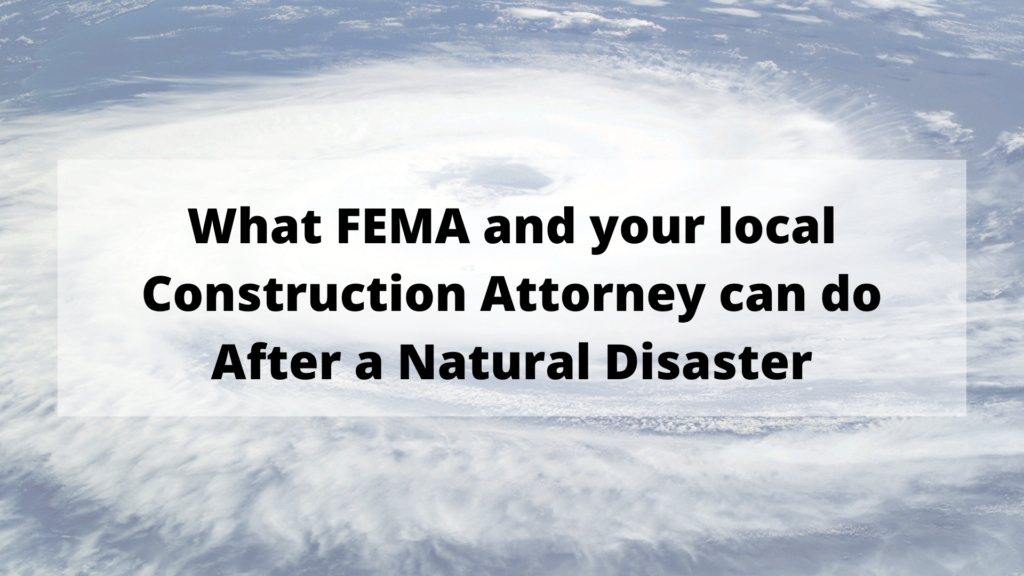
As we know, many of our neighbors are currently combating the harsh realities of post-disaster re-building. From hurricanes, earthquakes, wildfires, and tsunamis, we’ve come to know and understand the challenges that are faced when disasters like these occur. Luckily, in the United States, we have aid measures in place to help us recover from any such disaster. FEMA and the American Red Cross are two of the most common relief programs in the country. However, what about your local construction attorney? Within this article, we will be discussing how FEMA, the American Red Cross, and most importantly, an attorney practicing in construction law can help you succeed, in case of circumstances beyond your control.
As a New York and Florida-based law firm that practices in construction, the Law Offices of John Caravella, P.C., are able to guide our clients into mental repose after such tragic events. We assist in a wide range of services, and after math disaster circumstances such as reconstruction issues ranging from insurance claims and coverage issues, public adjusters, and reconstruction contract review and negotiations.
In New York, the “New York Rising Community Reconstructive Program” helps victims of catastrophic weathering with industry contacts and financial assistance. Depending on which state you live in, your local county may have similar assistance programs. A house-lifting contractor should always be licensed, insured, and references should be checked regarding past and present projects. Like New York, Florida also offers disaster relief programs in the form of grants, debris removal, protective measures, repair, restoration, and more. To learn more, please visit www.floridadisaster.org.
When it comes to reconstruction, most homeowners’ policies cover post-fire reconstruction. Reviewing and confirming your coverage limits and exclusions prior to the time a disaster strikes is always best practice. Contacting your qualified construction counsel can help put you back on track to restoration, before or after disasters hit.
FEMA, or the Federal Emergency Management Agency, supports United States citizens and first responders to help rebuild and improve conditions from any natural disasters. Currently, in Florida, victims of Hurricane Ian can apply for assistance in the following categories; employment, financial, food, housing, legal and medical. If a natural disaster strikes New York State, these same disaster assistance programs will be deployed. FEMA also has a Grant Funds program that is available for pre and post-emergency related projects. For more relief assistance, The American Red Cross responds to emergencies every 8 minutes. They help with finding clean water, safe shelters, and hot meals. From housefires, hurricane relief, wildfires, flood relief, and more, the American Red Cross can assist you within the moment response.
To Discuss your post-loss reconstruction options, construction claims, or solar system concerns, a complimentary consultation can be requested here.
 The author, John Caravella Esq., is a construction attorney and formerly practicing project architect at The Law Office of John Caravella, P.C., representing architects, engineers, contractors, subcontractors, and owners in all phases of contract preparation, litigation, and arbitration across New York and Florida. He also serves as an arbitrator to the American Arbitration Association Construction Industry Panel. Mr. Caravella can be reached by email: [email protected] or (631) 608-1346.
The author, John Caravella Esq., is a construction attorney and formerly practicing project architect at The Law Office of John Caravella, P.C., representing architects, engineers, contractors, subcontractors, and owners in all phases of contract preparation, litigation, and arbitration across New York and Florida. He also serves as an arbitrator to the American Arbitration Association Construction Industry Panel. Mr. Caravella can be reached by email: [email protected] or (631) 608-1346.
The information provided on this website does not, and is not intended to, constitute legal advice; instead, all information, content, and materials available on this site are for general informational purposes only. Readers of this website should contact their attorney to obtain advice with respect to any particular legal matter. No reader, user, or browser of this site should act or refrain from acting on the basis of information on this site without first seeking legal advice from counsel in the relevant jurisdiction. Only your individual attorney can provide assurances that the information contained herein – and your interpretation of it – is applicable or appropriate to your particular situation. Use of, and access to, this website or any of the links or resources contained within the site do not create an attorney-client relationship between the reader, user, or browser and website authors, contributors, contributing law firms, or committee members and their respective employers.
